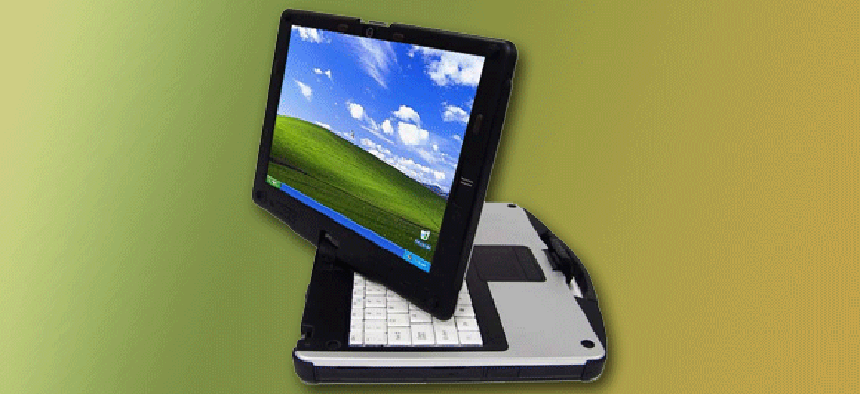Tablet/laptop for field work combines ruggedness and security


Connecting state and local government leaders
DuraBook U12Ci from GammaTech is a rugged tablet/laptop that includes a fingerprint reader.
UPDATE: This article has been updated to correct a reference to the size of the DuraBook's screen.
Military personnel and public-sector employees in the field often need rugged devices that let them work without worrying about environmental hazards. But sometimes a user might need the input capability of a tablet, while at other times that same user may need a full keyboard to perform other tasks. Obviously, users don't want to carry several different devices to do their jobs. For these users a convertible tablet/laptop might be just the thing.
The DuraBook U12Ci from GammaTech manages to fit this bill nicely. It is a rugged laptop that converts to a tablet quickly and easily. It has a 12.1-inch resistive touch display that can be used with either a finger or the provided stylus. The resistive type of touch screen makes sense in many field operations because it can be used while wearing gloves, which would have to be removed to make a capacitive touch screen work.
Transforming the laptop into a tablet is accomplished simply by rotating the display and locking it back down over the keyboard, at which point it is latched down in place. In this mode, the orientation of the screen can be rotated with the press of a button. Other vital buttons, such as power, are also right next to the display, so they can be accessed no matter what configuration the DuraBook is in. One of buttons opens a menu that allows users to enable or disable functions such as Wi-Fi or Bluetooth.
I found this DuraBook’s Intel Core i5 1.70GHz processor and 8G of memory to be quite capable of running Windows 7 Professional and any office-related software with no signs of lag. In the Passmark Performance Test benchmark suite, the DuraBook earned 1,482.3. This is a very respectable score for a laptop, and puts it near the top of similar devices GCN has reviewed.
The DuraBook definitely earns its “rugged” label. It passed rigorous MIL-STD-810G specifications for vibration (method 514.6) and it also passed the shock-due-to-drop test up to 48 inches (method 516.6). Most manufacturers test their notebook-sized devices to this height because it approximates the height from which it would typically be dropped by a user – while being carried around and used simultaneously. Since the display latches down in either configuration, the DuraBook had no problem passing these tests.
The Durabook also survived spills of up to 100cc of water (about 3.38 ounces) with the system up and operational. The ports all have covers that give provide good protection against dust. So this Durabook would do well in most conditions short of severe precipitation.
What will probably get the attention of government agency users is that the DuraBook comes with a biometric fingerprint swiper. Many laptop manufacturers leave out this feature, which can be extremely important in a secure government workplace. Having the fingerprint reader opens the doors for the DuraBook to be used in agencies where biometric authentication has been mandated. It is positioned just to the right of the display, so it is accessible in either the notebook or table configuration.
The DuraBook has an impressive number of ports. It has a gigabit Ethernet port, microphone and speaker/headphone jacks and a USB 2.0 port that would be the bare minimum on such a device. But it also has a USB 3.0 port and an eSATA port that could instead be used as another USB 2.0 port. An SVGA port n the back can be used with an external monitor or projector. For authentication and/or additional storage, the DuraBook had an SD card reader, an Express 34 card slot and an ISO 7816-compatible smart card reader. And of course on the bottom is an 84-pin docking connector that can be used to dock with a variety of stations.
One of the unusual features of the DuraBook was that the plain USB 2.0 port and the smart card reader actually were contained in an “I/O Module.” This module could theoretically be removed with a screwdriver and one of three other module configurations installed in its place. It also allows GammaTech to be more flexible with its configuration options to its customers. Although we’ve seen modules like this in other products, GammaTech has managed to come up with different options that would be useful in different circumstances. For instance, the module with the RS-232 serial port would be good for the user who needs to gain direct control over equipment in the field.
GammaTech has priced the DuraBook U12Ci at $1,928 as configured for this review. For a rugged convertible notebook/tablet with a biometric fingerprint sensor, this is a good price. The company offers builds that start at $999, so users should be able to find the balance between performance and value. This computer would do well in any general outdoor assignment, particularly jobs where biometric authentication is required.




